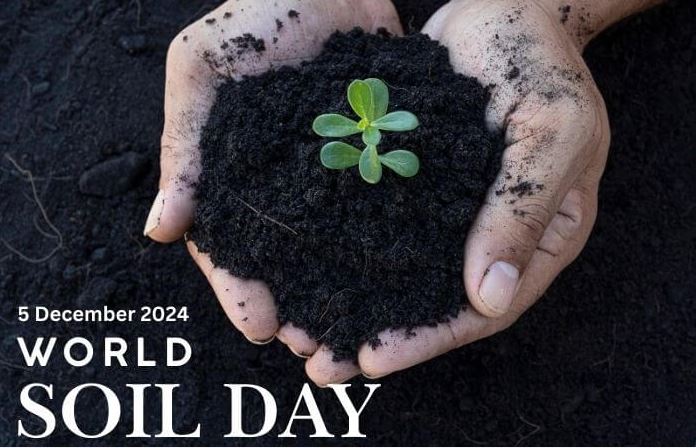
World Soil Day, celebrated on December 5, emphasizes the critical importance of soil health. This year’s theme, “Caring for Soils: Measure, Monitor, Manage,” highlights the need to assess and protect our soils. Healthy soil is essential for food security, biodiversity, and climate resilience. In India, where agriculture is vital to the economy, soil health impacts millions of farmers and their families.
The Significance of World Soil Day
World Soil Day serves as a reminder of the essential role that soil plays in our ecosystem. It highlights the urgent need to address soil degradation caused by urbanization, deforestation, and unsustainable farming practices. According to the Food and Agriculture Organization (FAO), 33% of global soils are already degraded, with India facing similar challenges. Alarmingly, over 30% of India’s agricultural land suffers from degradation, affecting its ability to support sustainable farming practices.
The significance of World Soil Day extends beyond agriculture; it encompasses environmental health and economic stability. As stated by Dr. Rattan Lal, a renowned soil scientist and Nobel Peace Prize winner, “Healthy soils are the foundation for healthy food systems.” This underscores the interconnectedness of soil health with overall human well-being and food security.
Historical Context of World Soil Day
World Soil Day was established in 2014 by the United Nations to raise awareness about soil’s importance. The date was chosen to honor the birthday of King Bhumibol Adulyadej of Thailand, a strong advocate for sustainable soil management. Since then, World Soil Day has focused on promoting sustainable practices globally.
In India, this observance is particularly significant due to the country’s diverse agricultural landscape. With over 50% of the population dependent on agriculture for their livelihood, the health of Indian soils directly impacts food production and economic stability. The Indian government has launched various initiatives aimed at improving soil health in response to this critical need.
Soil Pollution: A Growing Concern in India
Soil pollution is a significant issue in India. Industrial waste and agricultural runoff contribute to this problem. Polluted soils lead to reduced agricultural productivity and increased health risks for communities. A recent study shows that over 50% of Indian soils are contaminated with heavy metals due to industrial activities. This pollution not only affects crop yields but also poses serious health risks to those consuming contaminated produce.
In states like Punjab and Haryana, excessive use of fertilizers has led to severe soil pollution. The misuse of nitrogenous fertilizers like urea has disrupted the NPK ratio, currently at 7:2.8:1, far from the ideal 4:2:1, severely impacting soil fertility. According to the Desertification and Land Degradation Atlas 2023, approximately 97 million hectares, or 29.3% of India’s land, are affected by desertification.
The Harmful Effects of Chemical Fertilizers
The use of chemical fertilizers has become commonplace in Indian agriculture. While they boost short-term yields, their long-term effects are detrimental. Chemical fertilizers cause nutrient imbalances and harm beneficial soil microorganisms. Experts warn that excessive fertilizer use can lead to soil acidification, reducing fertility over time.
For instance, Ramesh, a farmer from Vidisha district in Madhya Pradesh, has seen his soybean yields dwindle despite adhering to modern farming practices. “Every season I follow all recommendations—apply fertilizers, use pesticides—but my fields don’t give the same yield,” he laments. Soil tests revealed high nitrogen but depleted organic carbon and micronutrient levels, a common issue in intensive soybean farming.
Depletion of Water Tables: A Hidden Crisis
India faces a severe water crisis exacerbated by poor soil management practices. Over-irrigation and excessive groundwater extraction have led to a dramatic decline in water tables across many states. In Punjab and Haryana, for example, the water table drops by 1 meter every year during summer months.
This depletion threatens agricultural sustainability and rural livelihoods. The National Institute of Hydrology reports that groundwater levels in northern India have declined by an alarming average of 0.3 meters per year since 2000. Farmers are increasingly facing challenges in accessing water for irrigation, leading to reduced crop yields and increased economic stress.
Sustainable Agricultural Practices: A Path Forward
To combat these challenges, India must adopt sustainable agricultural practices that prioritize soil health. Organic farming, crop rotation, and agroforestry can help restore soil vitality while reducing dependency on chemical inputs. The government has initiated programs like the Soil Health Card Scheme to educate farmers about sustainable practices.
Recent statistics indicate that farmers using these recommendations have reduced fertilizer costs by 10-25% while improving yields by 5-6%. This shift not only benefits individual farmers but also contributes to national food security as healthier soils lead to better crop production.
The Role of Policy in Soil Conservation
Effective policies are essential for addressing soil health challenges in India. Current initiatives focus on promoting organic farming and reducing chemical fertilizer use through educational campaigns and financial incentives for sustainable practices.
However, more needs to be done at both local and national levels. Policymakers must enforce stricter regulations on industrial waste disposal while promoting community-led conservation efforts that engage farmers directly in sustainable practices.
Engaging Communities in Soil Conservation
Community engagement is crucial for successful soil conservation efforts across India. Farmers should be educated about the benefits of sustainable practices through workshops and training programs organized by local governments or NGOs.
Additionally, initiatives like Krishi Vigyan Kendras (KVKs) play a vital role in educating farmers on sustainable soil management practices tailored to local conditions. These centers provide hands-on training that empowers farmers with knowledge about preserving soil health while enhancing productivity.
Statistics Highlighting India’s Soil Challenges
- Over 33% of global soils are degraded.
- In India, 30% of agricultural land faces degradation.
- Approximately 50% of Indian soils are contaminated with heavy metals.
- The water table drops by an average of 1 meter annually in some regions.
- Erosion causes a loss of about 15 tons of topsoil per hectare annually.
These statistics underscore the urgency of addressing soil health issues in India.
Expert Opinions on Soil Health
Howard Warren Buffett once said, “A farmer’s productive capacity is directly related to the health of his or her soil.” This statement emphasizes the importance of healthy soil for agricultural productivity. As we face climate change and food insecurity, prioritizing soil health becomes crucial not just for farmers but for society as a whole.
Dr. Rattan Lal also emphasizes that “Soil is not just a substrate; it is a living entity that needs care.” This perspective reinforces the idea that nurturing our soils can lead to broader environmental benefits.
Call to Action: What Can You Do?
Improving soil health requires collective action from everyone:
- Compost organic waste instead of throwing it away.
- Plant trees to prevent soil erosion.
- Support local farmers who practice sustainable agriculture.
- Educate others about the importance of healthy soils.
By taking small steps collectively as individuals or communities, we can make a significant impact on our environment.
Conclusion: Holistic Changes Needed for Soil Health
World Soil Day reminds us that healthy soils are essential for a sustainable future. To bring about holistic change in India’s soil management practices:
- Promote organic farming across all states.
- Implement stricter regulations on industrial waste disposal.
- Increase community engagement in conservation efforts.
- Invest in research for better soil management technologies.
- Educate farmers about sustainable practices through workshops.
Let’s commit to nurturing our soils so that they can nurture us back! Join hands this World Soil Day and advocate for healthier soils across India.
By focusing on these areas collectively as a society, we can ensure that our future generations inherit fertile lands capable of sustaining life while addressing urgent environmental concerns today!
Express India, Express….express your opinions and suggestions about the topic of this blog in the Comments section below.

The blog on World Soil Day 2024 highlights the critical importance of soil health under the theme “Caring for Soils: Measure, Monitor, Manage.” It discusses soil degradation in India caused by industrial waste, excessive chemical fertilizers, and water mismanagement, emphasizing its impacts on agriculture, food security, and rural livelihoods. The article advocates for sustainable practices like organic farming, community engagement, and stricter waste regulations.
Thank you, Manish for elucidating the gist of the blog’s contents very well!